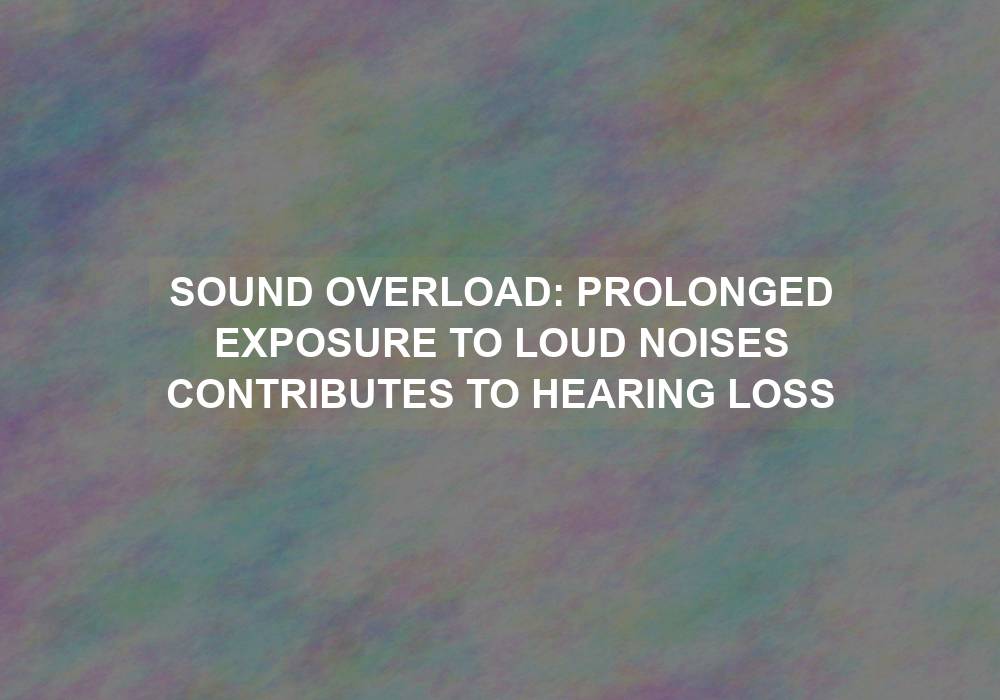Hearing is one of the most essential senses we possess, enabling us to connect with the world around us through sounds. However, the increasing prevalence of loud noises in our daily lives has become a major concern. Prolonged exposure to loud noises can lead to irreversible damage to our hearing ability, resulting in hearing loss. In this article, we will delve into the detrimental effects of loud noises on our hearing and explore preventative measures that can be taken to protect our auditory health.
Understanding the Impact of Loud Noises on Hearing
When we are exposed to loud noises, our delicate auditory system can suffer significant damage. The level of sound is measured in decibels (dB), and continuous exposure to sounds above 85 dB can be harmful. Noises that exceed safe levels can damage the hair cells in our inner ear, leading to hearing loss over time.
Temporary Threshold Shift (TTS)
Brief exposure to loud noises can cause a temporary reduction in hearing ability, known as Temporary Threshold Shift (TTS). This condition is often experienced after attending concerts, sporting events, or loud parties. The effects of TTS are generally reversible, but frequent exposure can increase the risk of permanent damage.
To prevent TTS, it is important to limit exposure to loud noises and use hearing protection when necessary. Wearing earmuffs or earplugs can significantly reduce the impact of loud sounds on our hearing. Additionally, taking breaks during loud events can give our auditory system the necessary time to recover.
Noise-Induced Hearing Loss (NIHL)
Prolonged exposure to loud noises can lead to Noise-Induced Hearing Loss (NIHL). This condition occurs when the hair cells in the inner ear are damaged beyond repair, resulting in a permanent loss of hearing. NIHL can be gradual, developing over time due to workplace noise, recreational activities, or even the excessive use of headphones.
To prevent NIHL, it is crucial to identify and minimize exposure to loud noises in various settings. This includes using hearing protection in occupational environments with high noise levels and reducing the volume when using personal listening devices. Regular breaks from loud activities can also help prevent the progression of NIHL.
Common Causes of Sound Overload
Various factors contribute to the prevalence of sound overload in our daily lives. Identifying these sources can help us take necessary precautions to protect our hearing:
Occupational Hazards
Certain professions, such as construction workers, factory employees, or musicians, expose individuals to high levels of noise regularly. These occupational hazards put them at a higher risk of developing hearing loss.
To address occupational hazards, employers should provide appropriate hearing protection equipment and implement noise control measures in the workplace. This can include using soundproof barriers, isolating noisy machinery, and implementing engineering controls to reduce noise levels.
Recreational Activities
Participating in recreational activities such as attending concerts, motor racing events, or using power tools without proper hearing protection can lead to long-term hearing damage.
To protect our hearing during recreational activities, it is essential to wear hearing protection, such as earmuffs or earplugs. Additionally, maintaining a safe distance from loudspeakers and taking breaks in quieter areas can help reduce the risk of hearing loss.
Personal Listening Devices
The increasing use of personal listening devices, such as smartphones and MP3 players, has contributed significantly to the rise in sound overload. Listening to music or other audio content at high volumes for extended periods can harm our hearing.
To prevent hearing damage from personal listening devices, it is important to follow safe listening practices. This includes keeping the volume at a moderate level and limiting the duration of listening sessions. Using headphones or earbuds with noise-canceling features can also help reduce the need for higher volume levels.
Preventative Measures: Safeguarding Our Auditory Health
Fortunately, there are several preventative measures we can take to protect our hearing from the detrimental effects of sound overload:
-
Use Hearing Protection: When exposed to loud noises, it is crucial to wear appropriate hearing protection, such as earmuffs or earplugs. This is especially important in occupational settings or during recreational activities where loud noises are unavoidable. Investing in high-quality hearing protection can significantly reduce the risk of hearing loss.
-
Limit Exposure: Whenever possible, try to limit your exposure to excessive noise. Take breaks during loud events, find quieter areas when necessary, and reduce the volume of personal listening devices. By minimizing the duration and intensity of noise exposure, you can help protect your hearing.
-
Maintain Safe Listening Levels: When using headphones or earbuds, be mindful of the volume settings. Follow the 60/60 rule – listen at no more than 60% of the maximum volume for no longer than 60 minutes at a time. Additionally, consider using noise-canceling headphones that block out external sounds, allowing you to listen at a lower volume. This can significantly reduce the risk of noise-induced hearing loss.
-
Environmental Modifications: Take steps to reduce noise levels in your immediate environment. Use soundproofing materials, close windows in noisy areas, and maintain a distance from loudspeakers or other sources of loud noises. Creating a quieter environment can help protect your hearing in both occupational and recreational settings.
-
Regular Hearing Check-ups: Schedule periodic hearing check-ups with a qualified audiologist. Regular assessments can detect early signs of hearing loss and allow for timely intervention. By monitoring your hearing health, you can take proactive measures to prevent further damage and preserve your auditory abilities.
Conclusion
The detrimental effects of prolonged exposure to loud noises on our hearing cannot be overstated. Understanding the impact of sound overload and taking preventative measures to safeguard our auditory health is crucial. By implementing the suggested measures and raising awareness about the importance of hearing protection, we can preserve our hearing abilities and enjoy a world filled with beautiful sounds for years to come.
This article is generated in markdown format.
